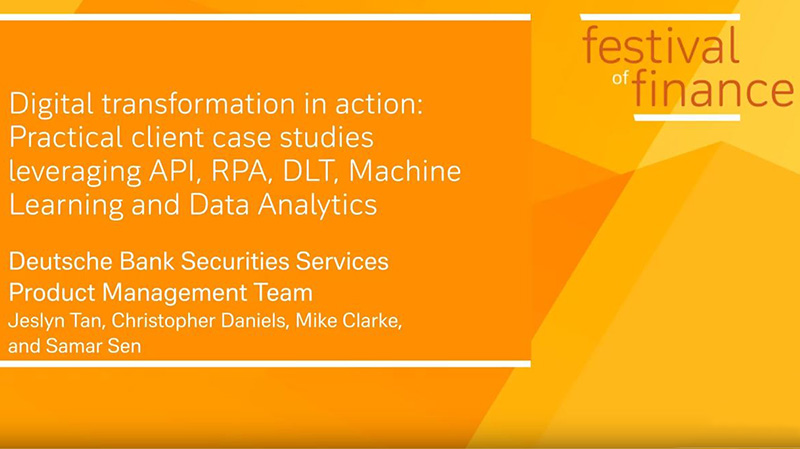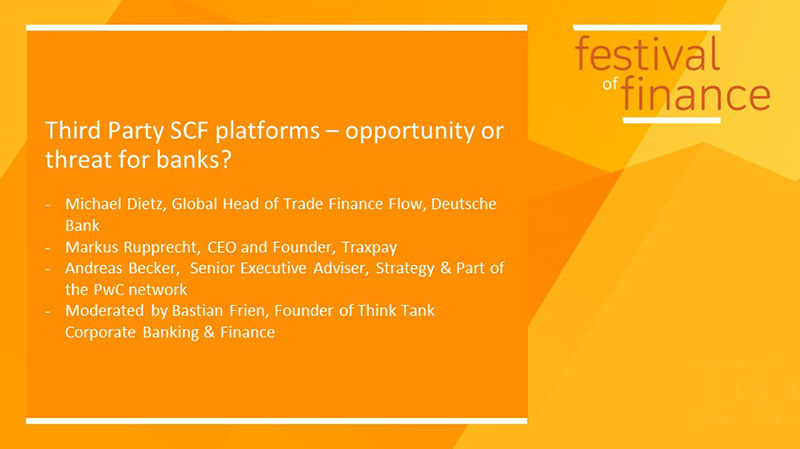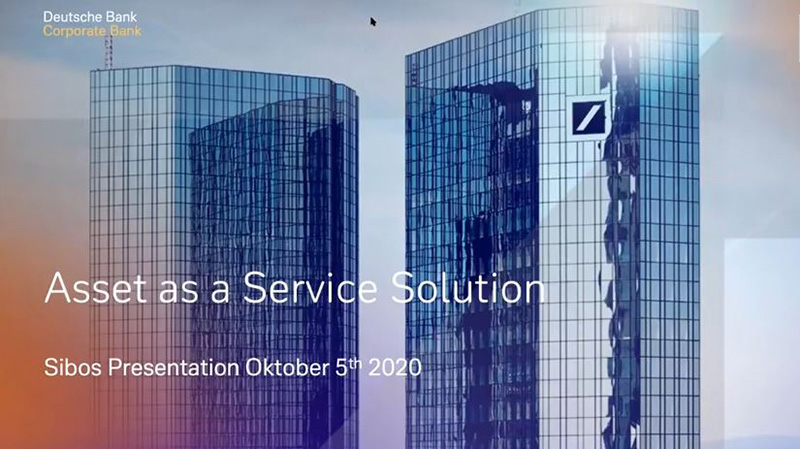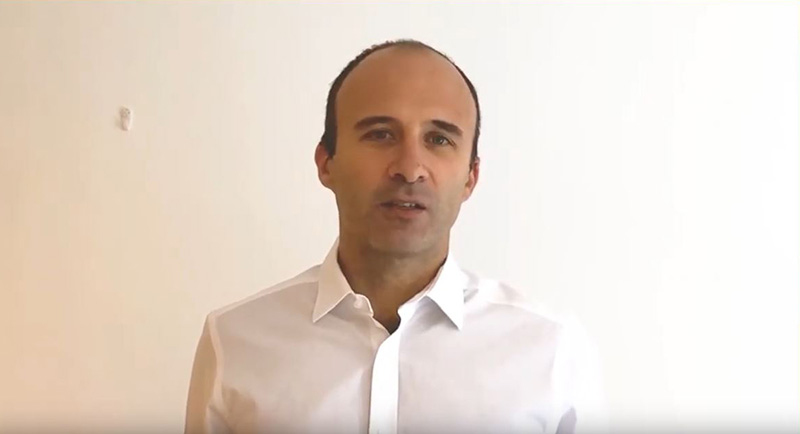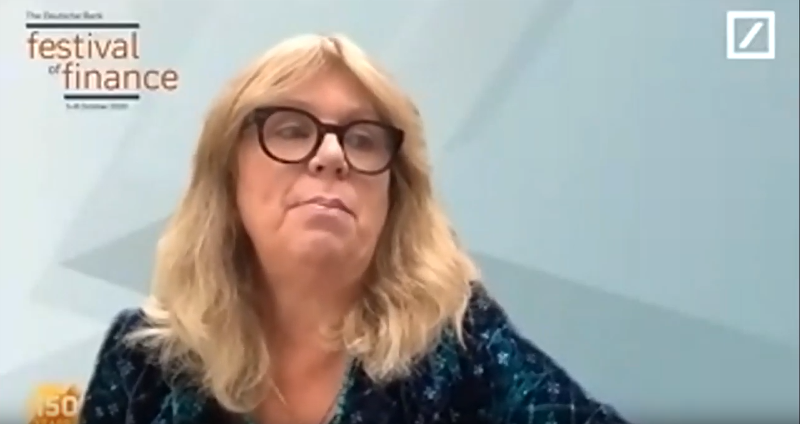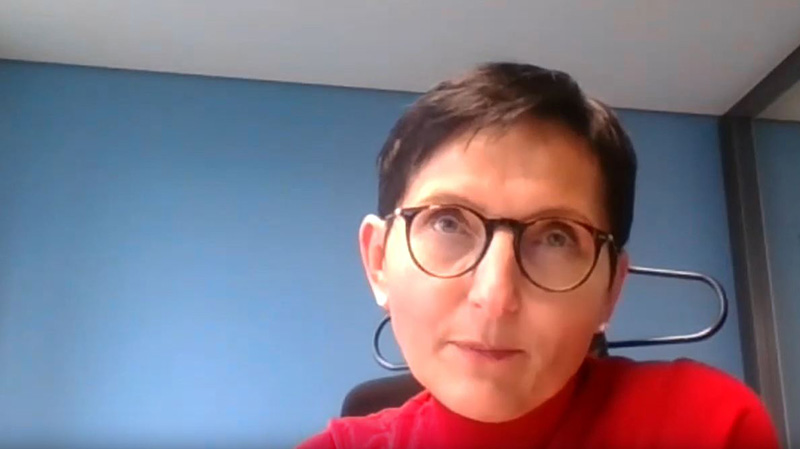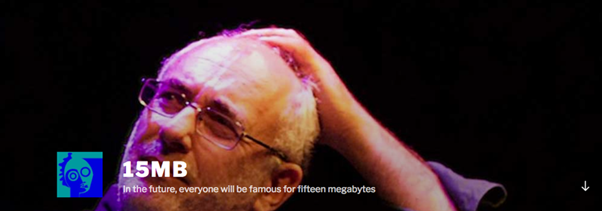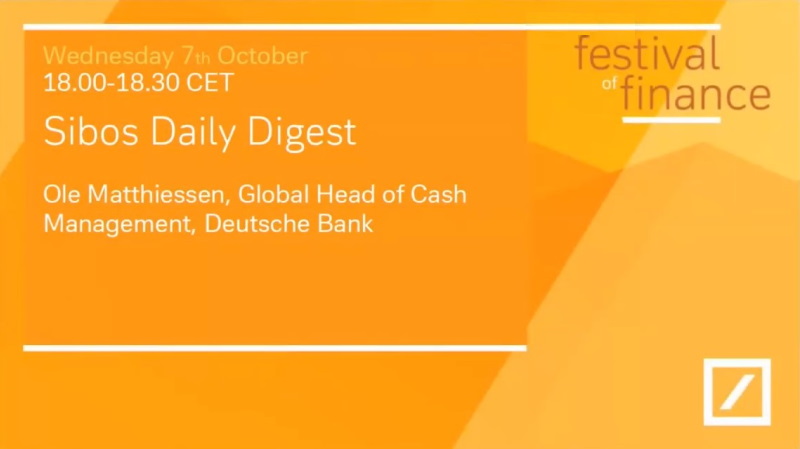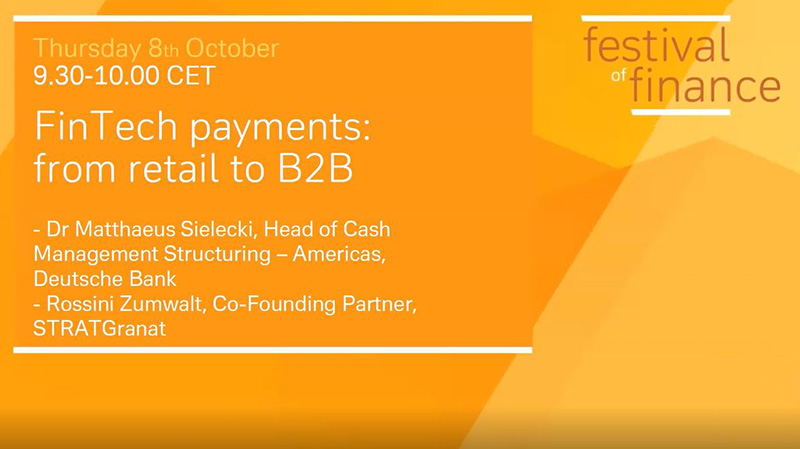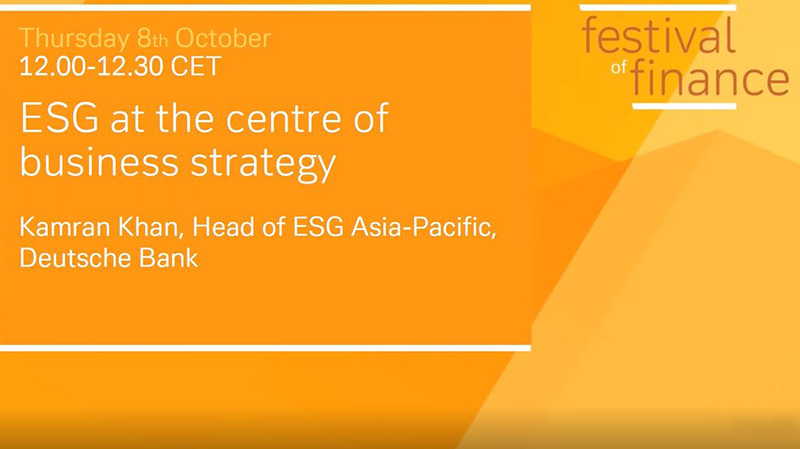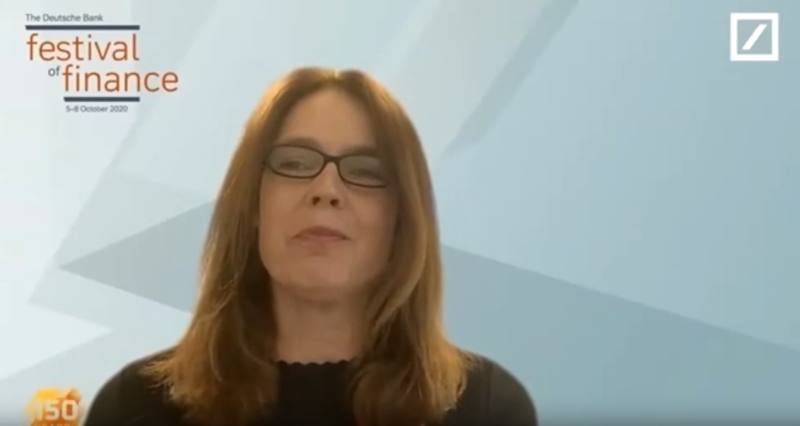Welcome
Sibos 2020 ran as a digital event from 5-8 October at sibos.com. Please download our Guide to Sibos for the inside scoop and a list of the sessions.
In 2020 we presented something special – the Deutsche Bank Festival of Finance. Over the entire length of the Sibos week, we ran a unique 3D festival platform. This offered a truly immersive avatar-based experience of digital networking, and provided a whole range of additional Deutsche Bank sessions and experiences. Click on the Deutsche Bank tab to see all the videos from our stand, and click on the Daily Highlights tab to select the write-up of each Sibos day and to watch the sessions from the Festival of Finance.
Deutsche Bank's Festival of Finance
Guide to Sibos
Sibos is fast approaching and we have decided to provide a unique way for you to meet with Deutsche Bank – via a 3D interactive world, where your Avatar can network with others ‘in person’ … the closest you’ll get to the real Sibos experience!
The Deutsche Bank Festival of Finance ran during Sibos week from 5th-8th October 2020, and offered a range of exclusive activities:
- Meet with Deutsche Bank experts
- Insights – a number of Deutsche Bank keynotes and experience some Deutsche Bank live panels on the key topics from within our interactive environment (carefully planned not to conflict with the Sibos agenda).
- Workshops – industry insight sessions on ISO 20022 and on SWIFT gpi
- Art Tent – award-winning artist Tom Pope ran a special interactive artwork during the week
- FinTech on the Beach – the FinTech community could join us at our Beach Bar to discuss the latest trends
- Yoga & Mindfulness Tent – yoga and mindfulness sessions
Download the Guide to Sibos 2020 here

Show content of Keynotes and workshops
Please see below the latest sessions, or download the attached PDF.
Monday 5th October
| Time | Topic |
| 10.00-10.30 CET |
Digital transformation in action: Practical client case studies leveraging API, RPA, DLT, Machine Learning and Data Analytics
|
| 11.30-12.00 CET |
on sibos.com Trade digitization: journeying beyond POCs and beyond financing
|
| 12.30-13.00 CET |
Trade Finance: Asset as a Service
|
| 16.00-16.45 CET |
Third Party SCF platforms – opportunity or threat for banks?
|
| 18.00-18.30pm CET |
Sibos Daily Digest, with Daniel Schmand, Global Head of Trade Finance and Lending, Deutsche Bank |
Tuesday 6th October
| Time | Topic |
| 9.30-10.00 CET |
Cloud, community and partnerships - the future of financial technology
|
| 10.30-11.00 CET |
Workshop: update on post-trade regulatory developments
|
| 12.00-12.30 CET |
FX market insights
|
| 13.00-14.00pm CET |
Workshop: Deep Dive into ISO 20022
|
| 10.00-10.30 CET
|
on sibos.com
|
| 18.00-18.30pm CET | Sibos Daily Digest, with Vikram Dewan, CIO, Corporate Bank, Deutsche Bank |
Wednesday 7th October
| Time | Topic |
| 9.30-10.00 CET |
on sibos.com
|
| 10.00-10.45 CET |
Intraday liquidity – the core of payments
|
| 12.00-12.30 CET |
Central Bank Digital Currencies (CBDC): the most important trend in payments?
|
| 16.30-17.30 CET |
Workshop: Deep Dive into SWIFT gpi
|
| 18.00-18.30pm CET | Sibos Daily Digest, with Ole Matthiessen, Global Head of Cash Management, Deutsche Bank |
Thursday 8th October
| Time | Topic |
| 9.30-10.00 CET |
FinTech payments: from retail to B2B
|
| 10.30-11.00 CET |
Workshop: Digital Asset Custody
|
| 12.00-12.30 CET |
ESG at the centre of business strategy
|
| 18.00-18.30pm CET | Sibos Daily Digest, with Michaela Ludbrook, Head of Securities Services, Deutsche Bank |
Click here for more information.
Show content of FinTech on the Beach
In the tradition of Innotribe, we will have our own innovation area – on the beach – at the Festival to host the latest FinTech trends and insights.
See you at the beach bar!
Show content of Art Tent
While at the Festival of Finance, visit the Art Tent to see a live installation and exhibition of the work of Tom Pope presented by the Deutsche Bank Collection.
Tom Pope has worked closely with Deutsche Bank since he won our Award for Creative Enterprises (DBACE) in 2011 for the artwork Time Bound that saw him transport a grandfather clock in a hearse from London to Geneva.
Many of Pope's works combine travel, performance and investigations of time. They're also often playful, and tongue-in-cheek. Pope received his master’s degree in photography from the Royal College of Art in London in 2011 and is the co-founder of ArtLacuna, an artist studio.
At the Festival, book in for a 7 minute session to experience Tom Pope’s live, fun and interactive performance of “One Square Club”, the most exclusive private members club in the world.
Find out more at tompope.co.uk
Opening Times
| Monday 5th |
12.30 – 2.00pm CET (11.30-1.00pm BST) |
| Tuesday 6th | 4.00pm – 5pm CET (3.00 – 4.00pm BST) |
| Wednesday 7th |
12.30 – 2.00pm CET (11.30-1.00pm BST) |
| Thursday 8th | 4.00pm – 5pm CET (3.00 – 4.00pm BST) |
Show content of Yoga & Mindfulness Tent
A chance to chill and experience the following Yoga sessions:
- Vinyasa yoga
- Chair yoga
- Mat-based seated yoga flow
- 10 minute energising flow
Mindfulness sessions
- Breathing exercise
- Mindfulness of Breathing
- Finding our inner resources
- Transforming our relationships
All sessions will be hosted by colleagues from within Deutsche Bank who use their passion for Wellness to make a positive impact both internally and externally:
- Alex Cross has worked in Deutsche Bank’s Brand Communications team for almost 11 years. Her love of yoga and how it supports her physically and mentally in the corporate world led her to complete her yoga teacher training in 2017. Eager to share yoga with colleagues, she teamed up with fellow yoga teacher Scott Robinson in 2019 to run Deutsche Bank’s employee-led yoga sessions and raise vital funds for the bank’s UK Charity of the Year, Hospice UK.
Alex’s yoga classes are strong and flowing, encouraging use of the breath to help calm the mind and the movement of subtle energy through the body to leave students feeling balanced and energised. - Viet Linh Le is member of the Corporate Bank Business Development team in London, UK. Born and raised in Germany by Vietnamese parents, Linh stands for diversity, authenticity, and personal development. Her love for people`s stories and potentials led to her 5-month qualification in life coaching with the Co-Active Training Institute (CTI). Linh also co-runs regular Mindfulness sessions for a global Deutsche Bank community to jointly practice the muscles of attention, resilience, and compassion.
Join Linh`s Mindfulness sessions to gain further perspectives on life and experience a guided exercise. With her uplifting energy, Linh welcomes participants with all levels of experience to go one level deeper, break the cycle of auto-pilot, and make conscious decisions that serve us well – all with a smile. - Scott Robinson is Head of Regulatory Policy (UK) for Deutsche Bank in the Transactions Policy & Advisory Group and is a qualified mindfulness meditation and yoga teacher, based in London, UK. Originally from Sydney, Australia, Scott’s background is in the financial sector in the City of London and runs the employee-led mindfulness and yoga sessions at DB with Alex Cross. Scott also teaches at Ten Health & Fitness, one of London’s leading boutique health and fitness providers.
Scott’s yoga practice is based on a style of dynamic vinyasa flow, whilst at the same time emphasising steadiness and good space in each yoga class. At the other end of the spectrum, Scott also offers classes in yin yoga, providing students the opportunity to find a different, more quiet side to their yoga practice.
With his mindfulness meditation practice, Scott brings a calm-abiding approach to each session, allowing students to experience stillness through mindfulness of breathing.
Sibos 2020
Session videos Session videos
Watch the session videos of all four event days on demand
Session videos Watch nowDeutsche Bank at Sibos
Deutsche Bank had a number of speakers during the Festival of Finance and at sibos.com where we presented our experts and more details of Deutsche Bank’s thought leadership and solutions.
Here are a few highlights:
- On Monday 5th Oct, 11.30-12.00 CET at sibos.com, Daniel Schmand, Head of Trade Finance and Lending at Deutsche Bank spoke on Trade digitization: journeying beyond POCs and beyond financing session
- On Tuesday 6th Oct, 9.30-10.00 CET, there was a Cloud, community and partnerships - the future of financial technology session featuring:
- Bernd Leukert, Head of Technology, Data and Innovation, Deutsche Bank
- Gil Perez, Group Head of Strategy and Innovation, Deutsche Bank
- Umesh Vemuri, Global Strategic Initiatives, Google
- Rafael Otero, Chief Product Officer, Corporate Bank, Deutsche Bank
- On Wednesday 7th Oct, Deutsche Bank’s Paula Roels spoke on an ISO 20022 panel on sibos.com, and Marc Recker spoke on SWIFT gpi
- On Thursday 8th Oct, 5.00pm CET, Deutsche Bank’s Corporate Bank CIO, Vikram Dewan, judged the Sibos Hackathon
Sibos 2020 - Day 1

As the Sibos community comes together for its first virtual conference, the flow editorial team are standing by to report on each day’s proceedings. From “Dream Big, Stay Fit” morning wake-up sessions, to understanding more about how emerging technologies and the accelerating move to digitalisation are becoming business as usual in payments and securities processing, the essentials of each day will be summarised here in five handy take-away points every 24 hours.
Virtual Sibos 2020
“We noticed when you watch content you are doing other things at the same time. We wanted to make sure the content was really watched and thought about,” reflected Head of Sibos Chantal Van Es on Sibos TV.
You have to hand it to SWIFT, not only did a record-breaking 18,000 delegates register for this year’s Sibos, but the first day set the bar for the rest of the week in terms of something for everyone and an agenda shaped but not dominated by Covid-19. Entitled Delivering digital value, we heard how banks are working with fintechs to tackle financial inclusion and liquidity issues, take the pain out of cross-border trade and how regulation needs to keep pace with the instant payment momentum.
Make the new habit easy
Those with alarms set bright and early were treated in the first session Dream Big! Stay fit: Movement to UK Doctor in the House TV personality Dr Rangan Chatterjee who advised on how to make changed behaviour stick. “The problem with making changes in general is that we make our plan when our motivation is high and we think that motivation is going to last. We should be making those new habits at the trough, which means when our motivation is low, because it’s easy to still do the behaviour.” Businesses understand this very well, he said. “Amazon needs a one click for a purchase. Five years ago, in order to make an order on Amazon, you had to go through four or five steps to check your order. Every step you take is a reason that you can back out of that transaction. Amazon, Netflix, YouTube understand behaviour change science and apply it.”
This was a point developed later in the day in the Keynote talk from J.P. Morgan Chase CEO Jamie Dimon (pictured below), when he reflected, “Look at fintech competitors, AliPay and PayPal. What did they get right and how do we adapt? These companies were born in the digital world and banks were not. They are good at looking at pain points and making it easier for the customer – and banks are good at creating pain points.”

Not impossible
Innotribe opened with Mick Ebeling, Founder and CEO of Not Impossible Labs, who has made it his life’s work to reconfigure what impossible means. He shared the case study of Intel, who had underwritten a Not Impossible Labs project in South Sudan to provide affordable prosthetic limbs to amputees by leveraging 3D printing technology. This investment from Intel, he continued, had resulted in a quantifiable improvement in the company’s brand recognition. While this looks forward to Sibos’ Banking for Humanity theme on Day 4, the learning point here is never giving up and always search for what technology is capable of doing and solving.
Covid-19 has accelerated digitalisation
This came out again and again in a number sessions as the day went on and looks set to resonate through the week. In Trade digitisation, journeying beyond POCs and beyond financing, Deutsche Bank’s Global Head of Trade Finance and Lending Daniel Schmand, together with Oswald Kuhler Managing Director of the ICC Banking Commission’s Digital Standards Initiative, Citibank’s Global Head of Trade Ebru Pakcan, and Wai Yee Choo from the Singapore Government’s National Trade Platform agreed that while there had been some good progress in digitalising trade with key investments in the back office such as OCR, “it doesn’t solve the problem of the interaction with the client and the digitalisation of that interface is the challenge”.
And while there have been some encouraging initiatives at local and country levels, such as Singapore’s 4,000 user strong Network Trade Platform, difficulties start once clients cross borders into other ecosystems and different systems connecting and transacting with each other. In a later Festival of Finance interview, Schmand reminded participants, “Digitalising trade documents via blockchain had been on the agenda for 10 years, but the attitude of the law towards digitised documents was still unclear. The ICC Banking Commission could and should play a major role in promoting digitalisation and common standards – although it would be detrimental for the pandemic to accelerate the process as mistakes could easily result.”
Turning to the View from the Top with Fan Yi Fei, Deputy Governor of the People’s Bank of China (PBOC), we heard more how the digital economy in which “data is king” is becoming more significant as a result of Covid-19. “Contactless activity had been in high demand and the post-pandemic period is likely to be marked by a hybrid of contactless and more traditional payment services,” said the Deputy Governor. He added that as the scale and complexity of the payments industry continues to grow, the PBOC will continue to curb any unlicensed businesses and use regulatory technology to increase its supervision.

Central bank digital currencies are closer than you think
In the Sibos Academy session Defining central bank digital currencies (CBDCs) a panel comprising: Markos Zachariadis, Greensill Professor in FinTech, Alliance Manchester Business School, University of Manchester; Alistair Milne, Professor Financial Economics, School of Business and Economics, Loughborough University; Arwen Smit, Author and Senior Advisor, MintBit; and Harish Natarajan, Lead, Payments and Market Infrastructures, World Bank, all moderated by Aaron Klein Fellow in Economic Studies, Brookings Institution, served as a helpful reminder that we might be seeing CBDCs in wholesale international payments sooner rather than later.
Smit defined three main forms of CBDCs: Direct issuance that involved a direct claim on the central bank; Hybrid or token-based CBDC which also involved a claim on the central bank but with intermediaries handling retail payments; and third, the two-tiered issuance in which the CBDC is a claim on intermediaries who handle retail payments. This third version appeared to be closest to the current model. Agreeing with her outline, Milne added that while the value is held by the central bank, trusted third parties can have delegated control.
The panel also considered whether CBDCs would first make headway in wholesale or retail. In advanced economies, there was agreement that wholesale would come first – although China could prove a different story. Conversely, in emerging economies there was likely to be a bigger retail focus on CBDCs. However, the arrival of Facebook’s Libra cryptocurrency was a potential game changer and Milne cited the decline of cash in developed countries such as Sweden, where retail could take CBDCs very seriously.
Look after SMEs
One of the benefits of Virtual Sibos 2020 is its wider inclusion to those businesses that would not normally be able to attend. This inevitably renewed the focus on the collective responsibility to look after SMEs. In the View from the Top with Ecobank’s Ade Ayeyemi, we heard how “the survival of Africa’s smaller businesses is vital if efforts to alleviate poverty can be maintained and greater opportunities must be opened up for micro enterprises to market their goods.”
And it was fitting that J.P. Morgan’s Jamie Dimon shared that his favourite book was the biography of former US Secretary of State George Marshall (George Marshall, Defender of the Republic) who came up with the post-war Marshall Plan – a financial aid programme for Europe. The spirit of this has been captured in the fiscal efforts around the world to support businesses during the pandemic, and example of which is set out in the flow article Germany’s lockdown lending.
To conclude, Day 1 was about Delivering Digital Value, and after a packed day to ensure that all the time zones could connect, we felt this was delivered several times over.
Driving digital transformation in securities services
Festival of Finance as part of Sibos
Supply chain finance platforms – opportunity or threat for banks?
Festival of Finance as part of Sibos
Trade finance: Asset as a service
Festival of Finance as part of Sibos
Sibos Daily Digest
with Daniel Schmand
Sibos 2020 - Day 2

As the Sibos community comes together for its first virtual conference, the flow editorial team are standing by to report on each day’s proceedings. From “Dream Big, Stay Fit” morning wake-up sessions, to understanding more about how emerging technologies and the accelerating move to digitalisation are becoming business as usual in payments and securities processing, the essentials of each day will be summarised here in five handy take-away points every 24 hours.
Virtual Sibos 2020
“We need to move from ‘know it all’ to ‘learn it all’,” urged Microsoft CEO Satya Nadella in one of the View from the Top sessions at Sibos with BNY Mellon CEO Todd Gibbons on Tuesday 6 October. This ethos, he said, remains at the heart of Microsoft and has defined how the company has reinvented itself throughout its 45-year history. But it has become even more resonant in the current pandemic. With Day 2 entitled Responsible innovation, it was no surprise that many of the sessions had underlying messages suggesting how to achieve the transition.
Being a learning organisation
The irrepressible TV Doctor Chatterjee was back to start the day with Dream Big! Stay Fit! Nutrition. We learned that “eating the rainbow”- fruit and vegetables of five different colours - daily not only varies your diet but provides a range of nutrients and is particularly good for a healthy gut. Another good principle, he counsels, is restricting food intake to a 12-hour period per day, and putting your mobile or laptop aside to eat is healthier.
This set the tone nicely for the theme of “being a learning organisation”, and it was Microsoft’s Nadella who pointed out that the level of maturity in financial services was evidenced in how it embraced new technologies. Furthermore, he added, businesses have had to dig deep to tackle the pandemic, recover, and reinvent how they do business.

Microsoft CEO Satya Nadella talked about the importance of being a learning organisation
In Deutsche Bank’s festival of finance session, the Bank’s Chief Technology Data and Innovation Officer Bernd Leukert (pictured below), took this further, and declared, “Today it is no longer enough just to offer the best possible financial services. We have to understand business models very precisely in order to be able to develop new offerings.” More insights on these new offerings and how they are developed can be watched in the video below. It fell to Vikram Dewan, the Corporate Bank’s Chief Information Officer to explain to delegates at the end of Day 2 how it engineers work with client engineers to make this happen.
Bernd Leukert, Chief Technology and Data Innovation Officer, Deutsche Bank talks about understanding business models
“Covid has accelerated the transformation agenda”, said BNY Mellon’s Todd Gibbons. “Scale is more important than ever, both in the applications and management of data. Client experience and expectations are much higher and even institutions want the look and feel that consumers are getting.” He added that machine learning is enabling the solutions unimagined even a few years ago. “When a trader executes a Treasury trade we can give them data on whether that transaction might fail and what they need to do to fix it.”
Learning is also about the people and their mindsets. At the starting out point on the career scale, we have our Sibos STAR scholarship “students” all sharing how and what they are learning through videos and social media. You can view Deutsche Bank’s 2020 participant, Product Analyst Karyna Hutarovich and some of her personal learning from Day 1 in a helpful video below. She attended the session on central bank digital currencies (CBDCs) because “it promised to define what CBDC is about”, which is “any form of central bank account held by non-banks”. Definitions are a great place to start!
Karyna Hutarovich, Deutsche Bank’s Sibos STAR Scholar 2020
Managing transformation
In Managing a pandemic: How did the industry cope with major workforce disruption? session moderator, Dr Catriona Wallace, the Sydney, Australia-based CEO of Ethical AI Advisory set out her three key topics as business continuity, leadership and digital transformation as they related to the pandemic.
Both her panellists were from major financial institutions: Greg Keeley is Executive Vice President and CIO of Canada’s TD Bank Group, which has 90,000 employees globally. Claire Calmejane is Group CIO Société Générale. Paris-based Société Générale is present in 62 countries worldwide and is a major European presence in car leasing and consumer finance. Keeley said the impact of the Covid crisis on TD Group had been significant and business continuity plans in place had to be adapted in response. The focus was on building capacity so employees could work safely from home and digital capacity was tripled. He felt the bank had done well in getting ahead of the curve once it became clear in February how its Singapore operations were being impacted.
Calmejane said that SG’s Asian operations were affected early on and 50,000 of the workforce transferred to working from home. As the retail bank operations already had a strong digital base that helped it adapt. At the height of the pandemic in May the bank was even able to successfully test a digital euro with Banque de France.
TD Group had set up what Keeley termed a fusion environment that provided for an agile team approach to top management. This provided clarity to their mission of protecting employees, continuing to serve customers and supporting communities.
Turning to new technology and digital transformation, Wallace said that investment in artificial intelligence (AI) has increased sharply this year with a 19% increase in Q3 over Q2. The panellists agreed that financial institutions are interested in the capabilities of AI and of machine learning: SG has developed a robot able to answer routine questions and locate a suitable subject expert for queries that it cannot handle. “We’ll see more of this augmented capability for helping home-based workers,” she predicted. However, there is a danger that unless “ethical AI” is applied, biases could end up hard coded into machines.
With so much focus on Covid and the near term, Nadella shared what Microsoft has learned from transformation and how that can be embedded for the longer-term good of the organisation. Organisations should focus on two pillars: One is the sense of purpose and reason for existing as a company and the other is culture to things that forward. “The ‘why’ and ‘how’ are necessary conditions,” he said. “In 1975 when we created the base interpreter of the Altair computer and today in 2020 it’s an even bigger market with a wider adoption usage. We built the tech so that others can build on the tech.”
Frictionless payments
In a session on SWIFT’s vision for frictionless payments Mark Buitenhek, Head of Transaction Services at ING and also chair of SWIFT’s Banking and Payments Committee spoke of how its new strategy will build on the success of the SWIFT gpi initiative by investing in a more efficient payments infrastructure that encourages major changes in the way financial institutions work together and leveraging ISO 20022.
David Watson, SWIFT’s Chief Strategy Officer said that in the face of increasing competition, regulation and costs, SWIFT aimed to harness the new technology, as an industry co-operative with unrivalled security standards to improve rapidly at scale with the right levels of risk and control. The new strategy will provide frictionless payments, smarter securities, rich data and an open, state-of-the-art platform that will evolve from simple messaging to full end-to-end transaction management. It will also have the flexibility for customers to adapt at their own pace. Watson added that the programme is an ambitious one that needs to involve the entire SWIFT community.
Harry Newman, SWIFT’s Head of Payments Strategy, confirmed the goal is to make international payments frictionless. While gpi had been successful it was time for the next step forward, with full transaction management available on a single platform. “The 11,000 financial institutions on the SWIFT network will be better able to connect and process payments,” he said.
Features will include end-to-end transaction integrity; backward compatibility; and a rich and open ecosystem all enabling financial institutions to compete more effectively and at lower cost. Although 100% frictionless is the goal, he acknowledged that international payments can be complicated and the system will, for example, identify cases where currency controls must be factored in.
Saskia Devolder, SWIFT’s Business Development MD for North Europe then moderated a panel discussion, with Bruno Mellado, Global Head of Payments, BNP Paribas; Melissa Tuozzolo, IGC Clearing FI Payments, Market Management & Industry Head, Citi; and Shirish Wadivkar, Global Head, Correspondent Banking Products, Standard Chartered Bank.
Tuozzolo spoke of her ability to make instant payments to a friend or family member and said that the aspiration is to have the same ability for cross-border payments. The panellists agreed that collaboration was the way forward as this goal wouldn’t be achieved by individual banks acting alone. SWIFT was an enabler in identifying problems and figuring out solutions – the enablers of collaboration in real-time including API interaction between banks when a new payment is initiated. APIs will move to the centre of payment initiation, forecast Tuozzolo.
Almost in response to Dimon’s observation on Day 1 that banks are good at creating pain points, Day 2 was about how organisations came together to solve common them. Gibbons shared how BNY Mellon is partnering with fintechs, enabling them to distribute their apps more effectively on their platform. “When two firms come together, we can learn together and build amazing things for our clients", he reflected.
This collaboration does not stop with the fintechs. BNY Mellon is also collaborating with other banks that have similar pain points to co-create solutions that benefit both organisations. In a separate session during Deutsche Bank’s festival of finance at Sibos on Day 1, the bank’s Securities Services product management team talked about a an API collaboration that leveraged two chatbots, BNY Mellon’s Selina and Deutsche Bank’s Debbie. The bots first met in 2018 and worked together on the Symphony platform to speed up settlement of securities by automating some of the manual process in the custody chain. Two years later the bots reunited to automate FX confirmation times in restricted emerging market currencies.
New technologies such as APIs and data mining have ramped up predictive power, increasing automation of securities settlement and reducing the cost per transaction. Internally, Gibbons and Nadella shared that keeping internal collaboration and productivity up is a worry, given this is best done in a social setting. “One thing that stands out is how people collaborate,” said Nadella. But a number of sessions drove home the point that you have to actually do something with the outcomes of the collaboration – and assimilate them into business as usual.
Data intelligence – and responsibility
Todd Gibbons on partnering with Microsoft
For a large financial institution getting data in order has been a major element about being on the efficient frontier. As a core technology trend, BNY Mellon is taking more advantage of the cloud than ever before, but like many systemically important banks it still has a lot of legacy to deal with.
“As the largest manager of investment data in the world – we’ve built our infrastructure over the last 25 years with clients, some on our own infra,” said Gibbons. BNY Mellon partnered with the Microsoft Azure platform to host data for the bank’s clients and take in third party data from those clients. Artificial Intelligence (AI) and Machine Learning (ML) tools were deployed work through it. “That puts us in a position to build apps such as distribution analytics for asset managers where they can see what investors are buying down to account level so they can design products in real time to boost their profits,” said Gibbons. We heard in the festival of finance earlier on Day 2 how a similar partnership was evolving between Deutsche Bank and Google where Umesh Vemuri, Global Strategic Initiatives at Google Cloud talked about how important it was to collaborate around privacy and regulation issues.
While new technologies continue to improve efficiencies in financial services, solutions that carry an immutable ledger of record for buying and moving goods remain highly sought after. One area where this technology is already being used to bring efficiencies and improve data transparency is in post trade. Mike Clarke, who heads up the Securities Services product management team at Deutsche Bank in Europe, provided an insight into the journey around a proof of concept launch at Sibos London 2019 using Distributed Ledger Technology (DLT) to improve transparency around beneficial ownership requirements.
There are two elements of privacy that DLT brings to this solution, noted Clarke. The first is in the element of a beneficiary data. This is needed for improving processes to understand who the beneficiary owner of the security is. Traditionally this has not been shared and it has not been held within sub custodians because of the governance around privacy about information. “DLT allows us to tackle that and store beneficiary information so it's only visible to our client, and then is anonymised for our internal processing,” said Clarke.
The other area of data privacy that becomes a concern is that of data localisation. Clarke shared that many regulators are now looking for data when being processed within a particular country to only be accessed in that country“, and again distributed ledger technology allows us to have each of our branches set up as nodes on the ledger, and only have the data replicated into that market to enable the privacy within that market to stay as well.”

Responsible innovation – what it means
By the end of Day 2 we learned that responsible innovation meant:
- Innovation is not just about cool apps, but finding solutions to problems clients have shared with you, and working through the nuts and bolts in partnership with them;
- Collaboration; and embedding learning into business as usual is a gamechanger;
- Banks are responsible for other people’s money, so innovation must always happen in a safe and secure environment.
It is a delicate balance.
FX market insights
George Saravelos, Global Head of FX Research at Deutsche Bank shares his outlook on the weakening dollar, along with his overall outlook for Europe, emerging markets and thoughts on inflation and global markets.
On the Day 2 Sibos Daily Digest, flow’s Clarissa Dann summarises the day and interviews Vikram Dewan, CIO of Deutsche Bank’s Corporate Bank.
Sibos Daily Digest
with Vikram Dewan
Workshop: Update on post-trade regulatory developments
with Deutsche Bank Securities Services Market Advocacy Team
Workshop: Deep Dive into ISO 20022
with Stephen Lindsay, Paula Roels, Simon Jones and Andreas Hauser
Sibos 2020 - Day 3

As the Sibos community comes together for its first virtual conference, the flow editorial team are standing by to report on each day’s proceedings. From “Dream Big, Stay Fit” morning wake-up sessions, to understanding more about how emerging technologies and the accelerating move to digitalisation are becoming business as usual in payments and securities processing, the essentials of each day will be summarised here in five handy take-away points every 24 hours.
Virtual Sibos 2020
Sibos has always been and remains stressful for its organisers and participants. But that is part of what Sibos is; all that intensity and energy. Diaries are packed with meetings (and it is no different in a virtual world) and nobody wants to miss anything. Add to that we have sessions to address all time zones – as Head of Sibos Chantal Van Es reminded us at the start, “It’s a long day so people can catch the sessions in real time.”
So it was fitting that our resident Dr Rangan Chatterjee started Day 3 with a reminder in Dream Big! Stay Fit: Mood that stress levels need to be managed. Tips include writing down one’s feelings about the day ahead, breathing in for three seconds, holding it there for four and breathing out for five. Getting out into fresh air is a good one, “Walk around in nature as the brain processes the serenity and this reduces cortisol,” which works a treat until one bumps into a colleague (or in the case of one of the flow team, their WFH partner) who has just lit a cigarette…which leads us neatly onto our first theme.
Managing cyber-attack risk
“A business falls victim to a cyber-attack every 14 seconds, the financial services industry is predisposed to this,” noted Deborah Hrvatin, Chief Risk Officer at CLS Group in a session aptly named Risk management: the world of worries. While a number of risks were discussed, cyber security was the one that also resonated in a number of other sessions that day. These panellists recalled ECB President Christine Lagarde stating on 5 February that a cyber-attack on a major financial institution just after the European System Risk Board had published a report estimating the cost to the global economy in 2018 of cyber breaches could be as much as US$654bn.
Former rail network risk manager Helen Hunter-Jones (now Chief Risk Officer at Pay.UK) compared payments to railways, as “when something goes wrong there is a huge contagion event” and observed that the criminal fraternity is seeing the move to digital payments as “an opportunity”.
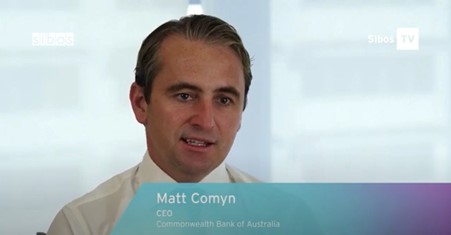
Matt Comyn, CEO of Commonwealth Bank of Australia on fraud risk with real-time payments
Matt Comyn, CEO of Commonwealth Bank of Australia confirmed in his View from the Top that the move to real-time payments had brought a new focus. “Fraud is always an issue, but with real time payments this has become a competitive element for bank to how they deliver on trust.” He added, “As we are sharing more data we need to be conscious of where data privacy is going and protect individual customer identity.”
Episode 11 of Sibos TV took this theme further, with Professor Stuart Madnick, Founding Director of Cybersecurity at the MIT Sloan School of Management to the 2019 Capital One data breach. He commented on how slow companies are to learn and adapt to new threats. “You need to understand the most valuable resource of your business and what protection methods are in place. People leave the back door open and windows unlocked and a key under the mat.”
Stuart Bailey, Head of Industry, Strategy and Design at Lloyds Banking Group helpfully shared how the bank’s Counterparty Cybersecurity Risk Management programme embedded protection into the customer relationships via the relationship managers. The UK bank processes 15.5 trillion payments each year, he said, so onboarding “clean” customers is vital. “The last thing we want to do is tell them ‘sorry you are not compliant’”. His particular worry, he said, was that while the larger financial institutions have programmes like this in place, the smaller “long tail” providers “don’t have the resources and need more attention”.
Cross-border payments

Victoria Cleland a year ago at Sibos London 2019, talking on Payments, a platform for innovation
In the Big Issue Debate, Cross-border payments: what role for banks in 2025?, Haslinda Amin, Chief International Correspondent for Southeast Asia at Bloomberg deftly moderated a panel comprising:
- Victoria Cleland, Chair, CPMI Task Force on cross-border payments and Executive Director for Banking, Payments and Financial Resilience at the Bank of England;
- Diane Reyes, Group General manager and Global Head of Liquidity and Cash Management, HSBC;
- Paul Stoddard, New Payment Platforms, Mastercard; and
- David Watson, Chief Strategy Officer, SWIFT
The panel concurred that Covid-19 has intensified the push for more efficient cross-border payments, but they are still too slow, inefficient and lacking in transparency. Too many are still not settled within 24 hours, noted Cleland and making them cheaper and more efficient will give a much-needed boost to the global economy. In 2017 the total value of cross-border payments was US$150trn, with the expectation that this figure will increase by a further US$100trn over the next 10 years.
In a follow up video interview with The Banker’s Joy McKnight, Cleland explained that ISO 20022 was hugely important to the Bank of England’s revamped Real Time Gross Settlement (RTGS) system and they were pushing ahead with the RTGS renewal programme.
Stoddard noted that the pandemic has produced winners and losers, with cross-border transactions impacted by the sharp fall in leisure and business travel but offset by a major rise in e-commerce volumes. Asked if banks are recognising the value of strategic partners in a time of crisis, he thought they had recognised the strengths and those areas where ceding some control was worth it if it resulted in a better customer experience. Mastercard, he said, “had been able to forge strong relationships with banks in times of stress”, which he hoped would continue after the pandemic.
Reyes agreed that recent months had seen a fall in cross-border volumes from late 2019 and a 20% drop in April this year followed by a slow recovery in subsequent months. Cross-border payments had been particularly in demand for medical supplies and PPE and the bank had been able to expedite supplies to the front line.
“What banks want in the cross-border payments arena is for them to be as secure as domestic payments,” added Reyes. “But we still suffer from a lack of consistency in areas such as sanctions screening and differing national payment schemes.” However, all agreed that the transition to ISO 20022 marks a major step forward.
Utilities, cooperation and regulatory reach
In the Sibos session, The future of post-trade, global platforms and strategic partnerships on Tuesday 6 October, it was agreed that more regulation and standardisation would be helpful – particularly since many participants are feeling the squeeze on fees.
Panellists from across the securities services spectrum highlighted that utilities have been proven to reduce costs and can add value to the rest of the industry. Functions such as corporate actions, dividend payments, know your customer (KYC), and collateral management – which can be standardised – have frequently been cited as being ripe for an industry utility model. Yet firms have historically been unable to work together, largely due to competition concerns.
This particular baton was taken up again in the 7 October Sibos session, SWIFT strategy overview: capital markets. Also called the ‘SWIFT gpi for securities’, the platform is being tested with industry partners with the view to announcing a pilot in 2021 and bringing the service to market in 2022.
Commenting on the vision, SWIFT head of Capital Markets strategy Lisa O’Connor said the platform is based on the use of data to provide end to end visibility on securities transactions moving through the entire chain in near real time. This will create efficiencies in the cash, securities and FX leg of transactions.
By standardising securities data SWIFT could validate information on any issues that might occur in the securities settlement chain further down the line; for example, reducing risk and settlement failure due to incorrect details, such as SSI information or information on a sanctioned entity. Industry users could address 30% of settlements that fail due to incorrect or incomplete data. The standardised securities identifier, or SSI information, could also help with end to end transaction monitoring.
Securities industry participants will be able to track and provide visibility on the latest state of the settlement instruction in near real time, said O’Connor. So everyone throughout that chain will have visibility of the information and be able to act on it, if required. This will enable the industry to deal with incoming regulations, because they have oversight of which securities transactions could potentially fail and hence be penalised under the Central Securities Depository Regulation’s Settlement Discipline Regime.
Through a mutualised platform that will enable end to end transaction management models for securities, users can reduce settlement failure, fraud risk unwanted costs and leverage the platform to offer more value to their own customers over time, said O’Connor.
Overall, there was a general consensus that the combination of new regulatory regimes, digitalisation and, of course, Covid-19 had triggered or accentuated pain points within the capital markets – and that the standardisation SWIFT can provide, based on industry feedback and factoring in tailoring for end clients at the point of service, can help resolve many of them.
Building on this theme, during a workshop session at the Deutsche Bank festival of finance on Day 2, Securities Services market advocacy experts, Emma Johnson, Mike Collier and Boon Hiong Chan provided an update on how regulation and standardisation could be seen as helpful. The Central Securities Depository Regulation (CSDR), the Shareholder Rights Directive II (SRD II) and rules governing the take-up of digital tools are three areas where regulators are pressing ahead with reforms, albeit at different paces and these should be seen as enablers of further innovation through digitalisation.
Europe’s SRD II lays down the minimum requirements as regards shareholder identification, the transmission of information and the rights of shareholders. The directive covers issuers’ rights to know who their shareholders are and intermediaries’ requirement to assist in the discovery process. In doing so, it aims to improve the dialogue and long-term engagement of shareholders with issuers to stimulate good corporate governance and company stewardship. Live from 3rd September 2020 its main impact would be felt by all intermediaries in the securities value chain, including CSDs and custodians and company shareholders or final beneficiaries owners of the equities.
Explaining that SRD II affects us all, Collier said that since the regulation makes custodians the conduit of real-time information between issuers and investors, this fosters more efficient capital markets. “By making the issuer CSD as the main source of information that can be transmitted through the holding chain in an STP manner, this will potentially mitigate the need to data scrub information and create a truly STP process”.
This process relies on the ISO20022 message standard for shareholder identification disclosure. It is the only ISO standard that is compatible with the obligation that enables an STP environment for messaging so it presents an opportunity to get the message through the securities chain quickly. This enables innovation, where new tools such as the ability to upload client data to a web portal are emerging to potentially replace today’s email and excel file exchanges, which carry risk through that process, and ensure the confidentiality of the data that is being transmitted. “As an industry we are encouraging standardisation in the identification space to be used productively to ensure security”, said Collier.
On CSDR, the next big date is February 2022, when the Settlement Discipline Regime (SDR) takes effect for anyone using a CSD to settle securities in Europe. Emma Johnson, director, market advocacy, corporate bank, Securities Services at Deutsche Bank told her festival of finance audience that the delay was welcome given the complexity of the regulation (which carries more than 70 articles) but urged them to use the time to factor it into their budgets. The regime will impose cash penalties for settlement fails. In order to avoid financial penalties, intermediaries in the transaction chain will need to conduct robust testing of their end to end systems.
Johnson said the cash penalty regime is unlikely to pose a major challenge for intermediaries in contrast to the mandatory buy-in rules. She pointed to the spike in settlement fails during the March 2020 time of volatility, highlighting mandatory buy-ins, which – had they been enacted under CSDR – would have worsened the situation. The jump in settlement fails exposed a lack of automation in post-trade processes and reinforced the need for digitalisation.
The future of money
David Birch is an author and commentator on digital financial services
Although this was the theme of the entire day, the SWIFT Innotribe session moderated by EY Parthenon’s James Lloyd at one stage made some of us wonder whether there would be any financial system at all in five to 10 years’ time.
We actually thought it was quite brave to invite author and blogger David Birch, who promptly came out with the observation “SWIFT is an affectionate tribute to the 1970s and in a world of central bank digital currencies (CBDCs) it is not clear what is going to happen.” His point was that given the “messy structures” needed to move money around such as reconciliation, confirmation, etc., once central banks could work through CBDCs SWIFT would be disintermediated. SWIFT’s Chief Innovation Officer Thomas Zschach took the jibe remarkably well and pointed out that money and payments connected to money have become digital – and this was the primary driver for the new SWIFT strategy. “SWIFT solved a practical problem of the time of payments not talking to each other and our new strategy is based on the fact the world is going digital, with payments going digital,” Payments lies at the heart of it, as CEO Javier Perez-Tasso explains in our flow cover story article, Responsible innovation.
Another interesting reflection was the reminder that just because the USD dominates now as the world’s reserve currency, this was not always the case and might not be so in the future. In the past it was the GBP and in some parts of the world not everyone, as Birch put it, necessarily thinks it’s great that America determines their monetary policy. He reminded his audience that former UK Bank of England Governor Mark Carney had, just over a year ago, articulated the need to "do something about the destabilising dominance of the US dollar".
It’s never a dull moment at Sibos, and there is something about Day 3... In short:
- Cyber threats are stepping up as payments become instant and frictionless.
- Counterparty risk has evolved into liquidity risk, but bar a major cyber security breach, controls are in place.
- Smaller businesses and financial institutions need support from larger ones and their governments.
- Utilities and regulation can reduce cost in a low-interest rate environment.
- Central Bank Digital Currencies could completely change the landscape and ecosystem – but will they really?
Festival of finance session videos
Central Bank Digital Currencies (CBDC): the most important trend in payments?
Session from the Deutsche Bank Festival of Finance, running alongside Sibos 2020, with Ignacio Terol, Robert Crozier and Marion Laboure, moderated by Alexander Bechtel
Deep Dive into SWIFT gpi
"Deep Dive into SWIFT gpi" workshop moderated by Dennis de Weerdt, Global Head of Service & Implementation, Deutsche Bank, with the following attendees
- Christian Fraedrich, Cash Management, Deutsche Bank
- Sebastian Rojas, Head of SWIFT gpi products, SWIFT
- Javier Orejas, Head of Banking – EMEA & Americas, IATA
Sibos Daily Digest
with Ole Matthiessen
Sibos 2020 - Day 4

As the Sibos community comes together for its first virtual conference, the flow editorial team are standing by to report on each day’s proceedings. From “Dream Big, Stay Fit” morning wake-up sessions, to understanding more about how emerging technologies and the accelerating move to digitalisation are becoming business as usual in payments and securities processing, the essentials of each day will be summarised here in five handy take-away points every 24 hours.
Virtual Sibos 2020
Wow! What a week! By the time we got to the end of Day 4 for Virtual Sibos 2020, this intense period of digital interaction had, all by itself, pushed the boundaries of insights absorption in a short period. Did we drive the evolution of smart finance? Well yes, but as a community – silos have no place in the New Order.

At the start of Sibos Boston 2014
With 22,000 delegates all signed up by the end (so 4,000 more joined as the week went on to double the previous record set at Sibos 2019 London), the inclusion aspect of this year’s event does, like much about Covid-19 forced innovation, present opportunities. Our closing keynote speaker, Citi CEO Michael Corbat talked about “enforced mindfulness”, suggesting the social movements that have unfolded in recent months could point the way forward for the financial industry.
With digital value, responsible innovation and crystal ball gazing into the future of finance, the final day, appropriately, looked to our industry and its footprint as a financial community with Banking for humanity. What does ESG (environment, social, governance) really mean in terms of business as usual? How has the pandemic changed working habits and communication channels? And are we as diverse as we think we are?
For those of you tempted to catch up by playing all the conference videos back to back, remember, says Dr Rangan Chatterjee, to “limit your exposure to blue light from your phone or your laptop in the evenings” as sleeping better “helps everything from performance to your relationships”.
Climate change and ESG
ESG and sustainability are mainstream performance indicators for not only corporates but the financial institutions that bank them and it was clear how different the Sibos 2020 ESG conversation was to that of previous years – there was no room for “greenwashing” – ESG is becoming baked into business as usual.
In Deutsche Bank’s fourth day of the festival of finance, Kamran Khan, Head of ESG Asia Pacific at Deutsche Bank Corporate Bank, reinforced the point when he said ESG’s arrival in financial service, in terms of “when it gets treated in the same way as many any other asset class and performs as well as others” is not far off. It will be at the exact moment when stocks trade in the secondary market based on the quality and the economics – and when the value of that instrument and the quality of the data impacts the price of that asset.
For Khan, ESG is a strategic issue. “It’s not just about pricing of an asset or deal, it’s where do you want to be as an organisation?” He explained that 2020 is the year of KPIs, taxonomies and standards in ESG (and was when Deutsche Bank launched its own standards aligned to the EU taxonomy definition principles). Khan said this taxonomy had the best chance of adoption globally but that businesses should not be distracted by it. “An ESG framework is defined more by the impact than the taxonomy,” he said.
Khan shared his top questions for a business to ask itself: What is your risk appetite and what enhances your business environment? How do your products make an impact? And how must you change them with the relevant KPIs to measure their impact?

BNP Paribas’ Jean Lemierre, Chairman of the Board of Directors told us in View from the Top that he sees the pandemic as “a major opportunity to address climate change, helped by the EU’s €750bn commitment to ensuring that the post-pandemic recovery is green”. Picking up on the EU taxonomy definition principles, he said these make it much easier to differentiate between what qualifies as green and what does not and the task for banks is to “direct those that currently do not qualify in the right direction”, such as such as transitioning electricity producers from coal to wind and solar, and ensuring that the shipping industry employs vessels using cleaner fuel.
Tomorrow began yesterday
Another theme that came through loud and clear on this concluding somewhat more reflective day, was the responsibility we have as a community for tomorrow’s wellbeing – and that of the next generation. Again, this was beautifully articulated by Citi’s Corbat, who reminded us that “ownership is different from stewardship” – with the latter including much greater emphasis on what you will pass on to your successors.

At this point it seems fitting to divert to the vision in the closing ceremony of our colleague Jacob Howard dancing with his children to the wonderful Zoom-enabled rock show, along with the 20 other recruits, to a rather different end-of-show celebration.
Another session that looked ahead to what tomorrow’s customers’ demand might look like was Managing the traditional world, while building out the digital future, moderated by Soumitra Dutta, Professor of Management and Former Founding Dean at Cornell University’s SC Johnson College of Business. Among his panellists was Nicole Zimmerman, Head of Customer & Marketing Global Payments at Western Union, who said that the digital future and greater mobility across borders would be the deciding factors, with the roll-out of fibre broadband and 5G networks “a game-changer of mobile technology.”
With many Sibos delegates having got a taste for working from home and hybrid working (divided between the office and home) digital transformation would go on speeding up. At which point we were reminded of Microsoft CEO Satya Nadella’s recent comment that two years of digital transformation was telescoped into two months just after the pandemic struck in March.
As all around the world firms and clients grappled with Covid-19 related volatility and uncertainty, business resilience and operational agility have become a source of competitive advantage, particularly in large organisations.
Platform economies and payments
With a week of much talk about partnerships between banks and BigTechs such as Google and Microsoft, it was refreshing to gather some insights into how all this drills down into what corporate treasurers are experiencing. First up in the festival of finance was Dr Matthaeus Sielecki, Head of Cash Management Structuring, Americas at Deutsche Bank and Rossini Zumwalt, Co-founding Partner at ecommerce and anti-fraud consultants STRATGranat.
Sielecki observed that the platform economy has widened the corporate treasurer’s mandate to support increased online payments growth. But it brings with it the need for due diligence on the platform so that there is trust between buyers and sellers. Zumwalt noted that in the past, treasury dictated the way in which payments were made but now B2B customers are exerting this power and specifying their preferred methods of transaction. She also pointed out that preferences varied by region and firms need to be flexible. “Companies that don’t also cater for cash payments as well as cards and digital, lose much of their potential customer base,” she said.
New operating models
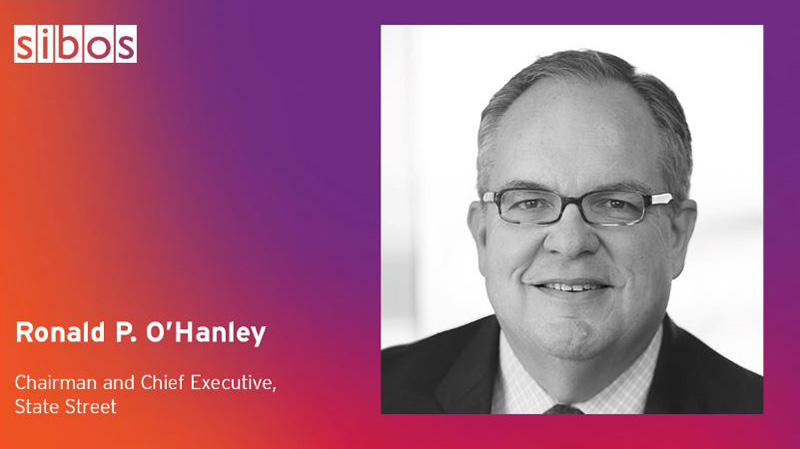
Turning to new operating models being driven out of necessity created by crisis Ronald O’Hanley, Chairman and Chief Executive of State Street (the world’s largest holder of investment assets under custody), urged asset managers to change their perceptions of themselves and their service providers.
“Life has not been easy for asset managers. Margin and fee pressures from their asset owner clients, cost pressures and competition from robo-advisers, have resulted in a race to the bottom to deliver alpha,” he asserted.
Faced with their own margin and cost pressure from these managers, asset servicing providers have endeavoured to cut their own costs and after much consolidation and outsourcing that effort seems almost over. During a View from the Top session on reinventing the asset servicing model, O’Hanley, stoked awareness among asset managers to realise that they have so much more than data and by working with their custodian this data can help their bottom line and drive revenues. “This is not a custody business but an information business,” he added.
Given fee pressure, the business today is more about helping asset managers with their operational and technology needs. Throughout their history these managers have started out with one foundation of technology, then added stack upon stack as they have grown. They now have multiple books of record.
So for State Street, it has meant reinventing the asset servicing model based on open architecture to make it easy for clients and third parties to feed their data in. O’Hanley explained that it’s about “helping asset managers to consolidate that data they sit on and targeting new operating models to get all of that data out of them to provide package analytics that can be employed in investment”.
The data edge, he revealed, “will be in the ability to harness it”. While the awesome potential of data featured throughout Sibos, the industry accepts that recognising this is a journey and not merely a sprint. Asset service providers need to educate asset managers and asset owners on how they work with the data and how they aggregate it. It’s about having a deep understanding of data, safeguarding and protecting that data and helping asset managers understand that what they get out is what they put in.
O’Hanley’s parting shot on this new asset servicing model was “You can’t just be a custodian, you have to have a front-to-back view of all your data and the asset manager client’s data to create customisable analytics for them. It’s also not about doing everything that the client wants you to, but doing what makes sense to enable alpha and their distribution by scaling up your operating model and providing open architecture to provide a service into which clients can plug and play.”
We thought his talk summed up one of the main messages of this year’s Sibos – using technology with the right partners to make things better for clients and shaping the solutions with those clients.
A number of us had accumulated memories of previous Sibos’, with long discussions about “solutions” and technologies that were missing that vital ingredient – an actual problem to solve. This session was a wonderful example of the step change we see now.
At the other end of the scale were the projects brought to the judges (among whom was our own Deutsche Bank CIO Vikram Dewan) of the Sibos Hackathon, where from a field of 70, six teams got through to the finals, decided by a judging panel and audience votes. The teams had been working for three weeks in cross-organisation teams (Clearstream, Finastra and several global banks) leveraging advanced analytic technologies such as machine learning and deep learning to deliver better customer outcomes and solve the following industry challenges:
- Managing risk and financial crime
- Transforming customer experience
- Fostering financial inclusion
Navigating exacting questions from the judges, such as how their solution would scale up and be distributed, output data you could trust (eg without false positives), three winners emerged, one of which included a team led by Deutsche Bank’s Moscow-based Software Development Engineer Kirill Gerasimov.
Banking for humanity
Turning to the main theme of the day, the Sibos session, Better banking, better lives featured BNP Paribas’ Alexandra Basirov, Commonwealth Bank of Australia’s Mohammed Khalil, Microsoft’s Bill Borden and Jolen Anderon from BNY Mellon.
Basirov cited Albert Einstein’s observation that “at the centre of every difficulty lies an opportunity” and this was certainly so on the move from a high-carbon economy to one of zero-carbon, which is both economically and technically feasible. The Paris Alignment Capital Transition Assessment, aka the PACTA 2020 Initiative, is a recently-published climate-related financial database that will enable banks to assess their loan book against the Paris Agreement targets and BNPP ended its financing of any coal-fired power projects in 2017. Reliable data is integral to assisting the transition to a zero carbon economy and the task is definitely achievable; Covid-19 having demonstrated the world’s ability to react quickly to a threat.
Morden talked about “meaningful innovation and diversity in technology”, with greater diversity in teams driving unique ideas and greater value. Anderson’s theme was on driving change though the culture of equity as this summer’s protests against social injustice had exposed persistent inequalities, racism and discrimination. “Diversity is a differentiating strength” she stressed and the financial industry is well positioned to drive greater equality and recruit inclusive leaders.
Finally, Khalil outlined the importance of financial wellbeing and why it should be the mission of the banks to improve the financial wellbeing of customers and their communities. Many of them in the most advanced economies were struggling with their finances even before the impact of the Covid-19 pandemic. However, in addressing their customers’ financial wellbeing banks had to move from intuition to evidence-based innovation. Commonwealth Bank of Australia had employed scientific analysis to understand the main components of financial health and devise the appropriate solutions as “customers quickly figure out whether your service is making a difference to their lives”.
Another session on diversity on Day 4, Diversity in investment needs to move up a gear, demonstrated some of these principles in action where Peter Akwaboah, Global Head of Shared Services Operations at Morgan Stanley and former Ghanaian international athlete recounted being asked by the Vice-Chair of the Investment Banking division to work with a front office team to lead a bond issuance programme in Ghana. Back office meets front office with a transformational outcome for the investment bank and also the country.
Dreaming Big

Having penned our five themes for the last day of Sibos, we were keen to imagine that we had really been in Boston Massachusetts and not been incarcerated behind our laptops all week at home. A lovely reminder of the city dubbed “the Cradle of Liberty” is the Sibos community support of Boston charity Dream Big! For 2020, Sibos had partnered with the charity, which empowers girls and young women from low-income situations through sports and physical activities that contribute to their health, education and overall wellbeing. Funds raised during the week will go towards 100 pairs of sneakers, 100 basketballs and 100 uniforms.
See you in 2021 – whether it be in Singapore or a laptop screen!
Festival of finance session videos
FinTech payments: from retail to B2B
Dr Matthaeus Sielecki, Head of Cash Management Structuring – Americas, Deutsche Bank
ESG at the centre of business strategy
Kamran Khan, Head of ESG Asia-Pacific, Deutsche Bank
Workshop: Digital Asset Custody
"Digital Asset Custody" workshop from the Deutsche Bank Festival of Finance, running alongside Sibos 2020, with Samar Sen from Deutsche Bank AG
Sibos Daily Digest
with Michaela Ludbrook

